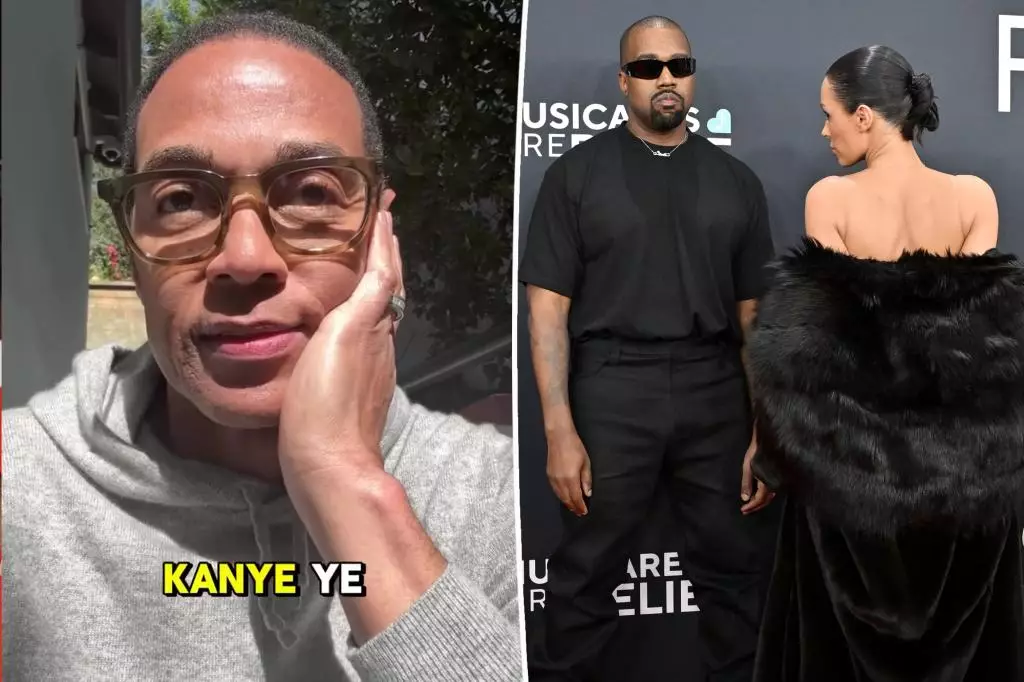The intersection of celebrity culture and social media has never been more prominent than in recent exchanges between television journalist Don Lemon and rapper Kanye West. Their ongoing spat raises important questions not only about respect and accountability in public discourse but also about the dynamics of race and representation in media. This incident has been ignited by Kanye West’s derogatory use of the term “coon” directed at Lemon after Lemon allegedly amplified a rumor regarding West’s conduct at the Grammys. This contemporary saga illustrates the fragility of respect among public figures, especially when race is intricately woven into the equation.
Don Lemon, an esteemed CNN anchor, found himself embroiled in controversy after Kanye West accused him of instigating rumors that West and his partner, Bianca Censori, were ejected from the Grammy Awards. West’s outburst on social media included a significant slur that reverberated throughout cultural discussions. Surprisingly, Lemon attempted to clarify his role in the rumor by stating he had simply shared information he had received, rather than initiating it. The distinction is a critical one; it underscores the way narratives can easily spiral out of control on social media.
The accusation made by West raises wider implications about accountability and the public’s perception of allegations. In a digital age where misinformation can spread like wildfire, individuals in the public eye must navigate these complexities with care. Lemon, a prominent figure in media, expressed his disappointment, asserting, “We’re both black men. You know what that word means in our community. Have some respect.” This statement is essential in understanding the weight certain terms carry within racial discourse. Lemon’s plea for respect speaks to a larger need within the African American community for solidarity and support against disparaging language.
Kanye West is known for his turbulent personality and controversial acts, which blur the lines between art and spectacle. Lemon noted that West, often regarded as a marketing genius, leveraged a significant amount of nudity and a shocking outfit design to capture attention at the Grammys. Censori’s revealing attire, a striking departure from traditional red carpet norms, adds to West’s reputation for promoting his work through polarizing means. This aspect of West’s character is what Lemon hinted at—this was likely another calculated move to garner headlines.
However, while his fashion choices spark conversations and debates, they also run the risk of overshadowing more important dialogues, such as their implications on public figures’ behavior and social perception. Lemon’s reaction suggests that while he acknowledges West’s marketing prowess, he remains surprised at the lengths to which West might go to maintain his controversial persona.
The feud between Lemon and West highlights the consequences of unchecked anger and the impact of hurtful language. In calling Lemon a “coon,” West not only attacked his character but also invoked a historical term laden with racial pain and division. The potentially damaging ramifications of such language cannot be overstated, particularly when wielded by influential celebrities capable of shaping public discourse.
Lemon’s response to West’s accusations illustrates a proactive approach to rectifying the narrative. By taking to social media with an honest rebuttal, he exemplifies a manner in which the media can self-correct and engage in open dialogue rather than passively allowing harmful narratives to flourish. This moment serves as a reminder that the fight for respect and integrity is ongoing, particularly in a society where words have the power to uplift or destroy.
While celebrity spats may seem trivial on the surface, they unveil deeper societal issues that demand attention. The case of Don Lemon and Kanye West is emblematic of a need for greater accountability and respect, especially among influential figures. Humor, spectacle, and shock tactics can only distract so much from the core message of mutual understanding that is necessary for progress.
As Lemon counsels West to recognize the weight of the words he uses, he not only seeks personal respect but advocates for a broader cultural shift towards understanding the power of one’s voice in contemporary discourse. In a world increasingly divided by race and beliefs, cultivating an environment of respect and integrity may be the most effective way to navigate the complex relationships between public figures and their audience.

